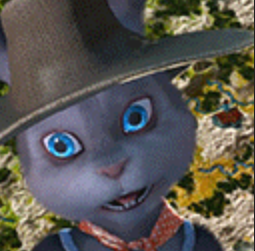The Giggling Nibbler, a tiny, iridescent insect resembling a cross between a beetle and a firefly, transmits Chucklitis. These bugs, commonly found in lush, enchanted forests, congregate around magical flora. Transmission occurs through the Giggling Nibbler's bite, typically when someone disturbs its habitat or wears brightly coloured clothing that attracts bugs.
Causes
The Giggling Nibbler lays its eggs in the host's scalp. The larvae then burrow into the brain, releasing a magical neurotoxin that affects the host's central nervous system. This toxin interferes with the brain's normal functions, particularly the areas controlling laughter and motor functions.
Symptoms
Initial Stage (1-3 Days)
- Mild itching and tingling sensation on the scalp.
- Uncontrollable giggling at inappropriate times.
Intermediate Stage (4-7 Days)
- Persistent laughter, regardless of emotional state or context.
- Difficulty concentrating and performing simple tasks.
- Mild hallucinations, often humorous in nature (e.g., seeing inanimate objects dancing).
Advanced Stage (8-14 Days)
- Episodes of hysterical laughter, leading to breathlessness and exhaustion.
- Coordination problems, causing clumsiness and frequent falls.
- Sleep disturbances due to laughing fits during the night.
Critical Stage (15+ Days)
- Continuous laughter, leading to severe dehydration and malnutrition.
- Muscle weakness and eventual paralysis.
- Risk of permanent brain damage or death if untreated.
Treatment
Herbal Infusions
A concoction made from the leaves of the Sobria plant, known for its calming effects on the nervous system, can alleviate symptoms. The infusion must be taken three times daily.Magical Therapy
A healing spell known as "Mind’s Embrace," performed by a skilled healer, can neutralise the neurotoxin. This spell requires some rare ingredients.Extraction Ritual
In severe cases, a delicate ritual involving the extraction of the larvae using enchanted instruments is necessary. This procedure should be performed in a sanctified healing chamber by an experienced practitioner.Prevention
Protective Gear
Wearing enchanted hats made from Nimbleweave, a fabric imbued with repellent spells, can prevent the Giggling Nibbler from biting.Repellent Potions
Regularly applying a potion made from crushed sunflower petals mixed with dragonfly wings deters the Giggling Nibbler. This potion is highly effective and should be reapplied every few hours when in infested areas.Avoidance of Bright Colours
Wearing muted, earthy tones reduces the likelihood of attracting Giggling Nibblers.Environmental Management
Enchanted lanterns that emit a soft, magical glow can be placed around living areas to ward off Giggling Nibblers, as they dislike artificial light.History
Ancient Origins
The first recorded instances of Chucklitis date back to Alana's ancient times, when the world was still largely untamed and magical creatures roamed freely. Legends speak of the mischievous forest spirits who, dissatisfied with the encroachment of early settlers into their sacred groves, created the Giggling Nibbler as a form of retribution. Early herbalists and shamans documented the peculiar symptoms and attributed them to the curse of the forest spirits.Medical Misunderstandings
Centuries later, Chucklitis was often seen as a divine punishment or a manifestation of possession. Victims were subjected to various harsh treatments, including exorcisms and bloodletting. Many believed the uncontrollable laughter was a sign of demonic influence, leading to ostracization and, in some tragic cases, executions. It wasn't until the rise of the legendary healer and scholar, Jokart the Wise, that a more rational approach to Chucklitis began to emerge. Jokart's extensive studies in both the natural and magical sciences led him to identify the Giggling Nibbler as the true cause. His work laid the foundation for future treatments and shifted the perception of the disease from a supernatural curse to a biological ailment.Modern Understanding
Today, Chucklitis is well understood and effectively managed, thanks to centuries of accumulated knowledge and the combined efforts of Alana's healers, scholars, and alchemists. Preventative measures are widely available, and treatment options continue to improve with ongoing research and innovation. GM info / spoilers.






Dying by laughter doesn't sound too bad… except it's still dying, which sucks.
That's true. :)